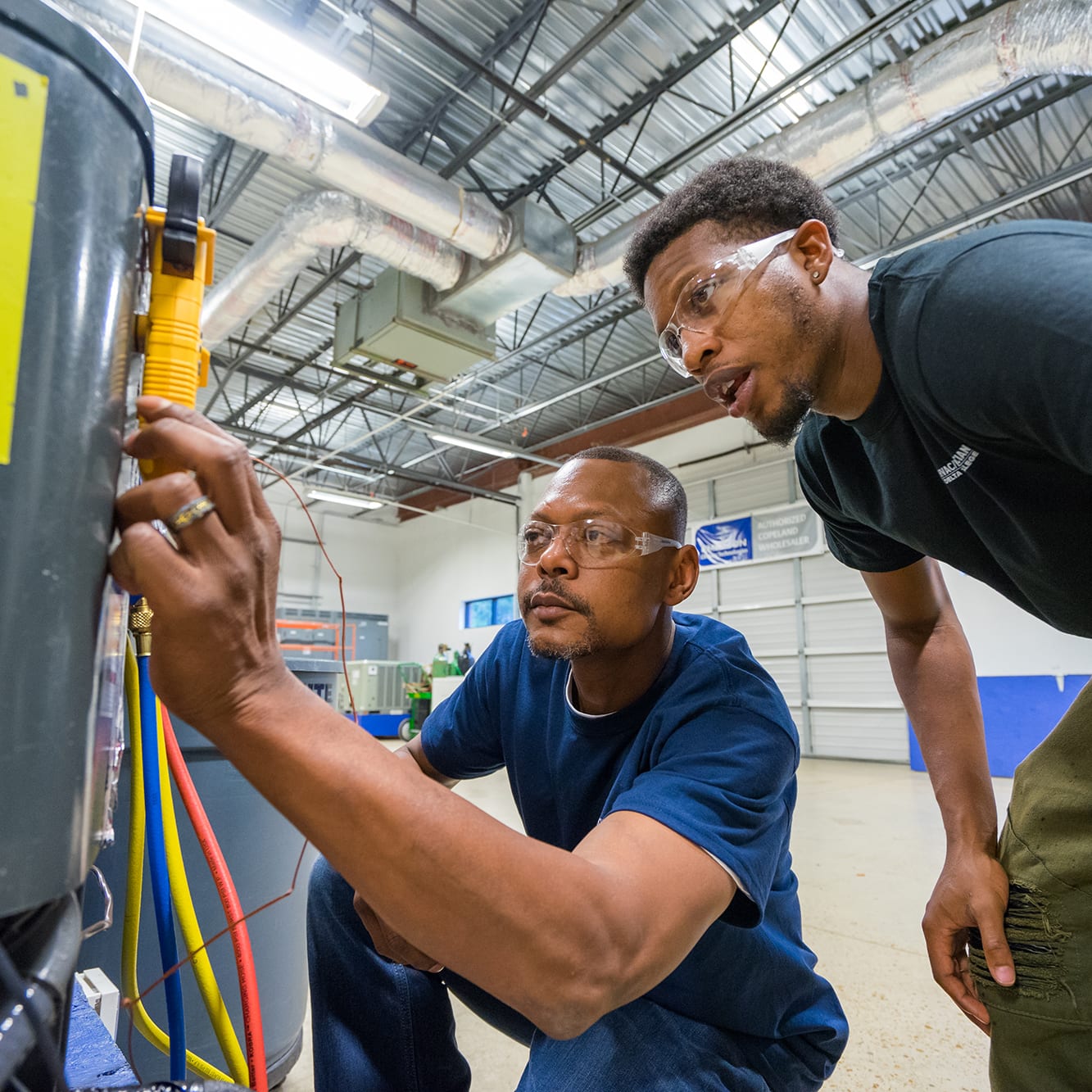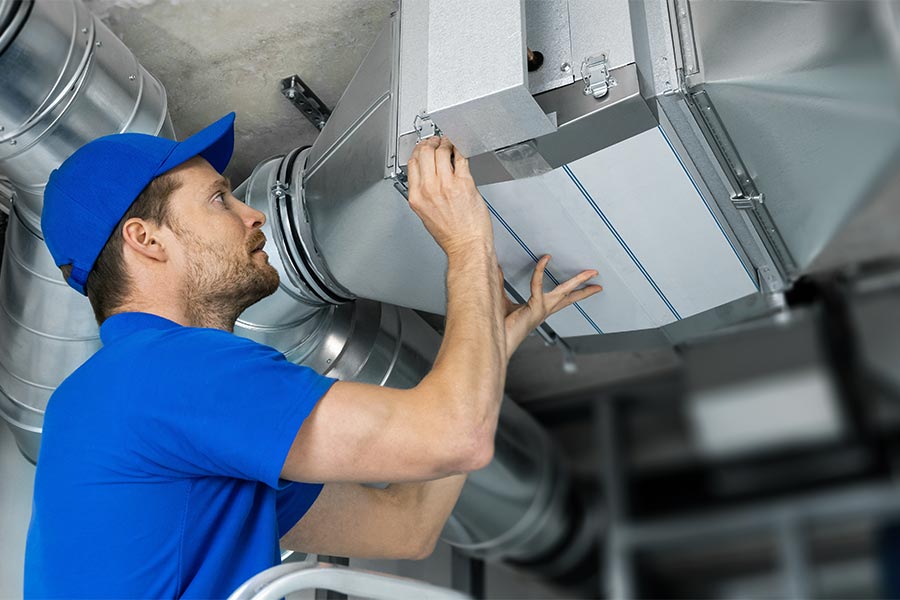Recognizing the Various Types of A/c System for Optimal Performance
Recognizing the various types of a/c systems is crucial for house owners intending to enhance convenience and energy efficiency. Air conditioning systems give consistent temperature level control, while ductless mini-split systems offer versatility. Heat pumps provide efficient year-round environment management. For smaller sized rooms, window and mobile a/c serve as practical options. Geothermal systems utilize consistent underground temperatures for lasting heating & cooling. Each choice holds special advantages, triggering a closer exam of which might suit private demands best.
Central Air Systems
Although lots of property owners look for means to enhance interior comfort, comprehending main air conditioning systems is crucial for effective environment control. Central air operates by circulating cool air via a system of air ducts, distributing it uniformly throughout the home. This kind of system contains a number of key parts, including an exterior compressor, an interior evaporator coil, and a network of ductwork.
The compressor cools down cooling agent, which after that absorbs heat from indoor air as it travels through the evaporator coil. This cooled air is pressed via the ducts and into living rooms, ensuring a constant temperature level. Central air conditioning systems are known for their efficiency, commonly using programmable thermostats to maximize energy usage. Routine maintenance, such as filter changes and system checks, is important to ensure long life and efficiency. Recognizing these components aids homeowners make notified choices relating to installation and upkeep, ultimately improving convenience and power efficiency in their homes.
Ductless Mini-Split Systems
Ductless mini-split systems supply a flexible option to traditional central air, accommodating house owners seeking efficient environment control without the requirement for extensive ductwork. These systems contain an exterior compressor system and one or even more indoor air-handling units, permitting for targeted air conditioning and home heating in particular locations or spaces. This zoning capability boosts comfort by making it possible for individuals to change temperature levels based upon specific preferences, eventually causing energy financial savings.
Installment is normally less complex and less intrusive contrasted to ducted systems, which can be helpful for older homes or areas with limited structural alterations. Furthermore, ductless mini-split systems often include energy-efficient innovations, such as inverter-driven compressors, which maximize power consumption based on need. Their compact design additionally permits different placement choices, making them optimal for tight or unusual rooms. Therefore, ductless mini-split systems have obtained popularity amongst home owners seeking contemporary, efficient HVAC services.
Warmth Pumps
Warmth pumps represent a versatile and energy-efficient option for both home heating and cooling residential areas. These systems operate by transferring heat instead of producing it, making them especially efficient in moderate environments. Throughout warmer months, warm pumps remove heat from inside and release it outside, offering cooling. On the other hand, in winter season, they reverse this procedure, drawing warm from the outside air or ground to heat the inside.
There are 2 key kinds of heatpump: air-source and ground-source (or geothermal) Air-source warm pumps are a lot more typical as a result of their simpler setup and reduced initial price, while ground-source designs boast greater performance and security in efficiency. In addition, heatpump can notably lower energy expenses and carbon impacts when contrasted to traditional home heating methods, making them an environment-friendly option. In general, heat pumps stand as a compelling option for additional info property owners seeking reliable climate control throughout the year.
Window and Portable Air Conditioners

On the other hand, mobile ac system use flexibility, as they can be easily relocated from space to space. These systems normally call for a venting set to wear down hot air with a window, yet they supply a practical alternative for short-lived cooling demands.
Both types of air conditioning unit are ideal for renters and those seeking to prevent substantial setup processes. Users should think about elements such as BTU ability, energy performance rankings, and noise degrees when choosing a system to guarantee peak efficiency for their certain area and air conditioning needs.
Geothermal Heating & Cooling Solutions
As energy performance becomes increasingly important, geothermal home heating and cooling systems have actually gained popularity for their lasting approach to climate control. These systems use the secure temperatures discovered underground to give home heating in wintertime and cooling in summer. By using the planet's natural thermal energy, geothermal systems significantly decrease dependence on nonrenewable fuel sources and lower utility expenses.

Moreover, geothermal systems commonly need less upkeep compared to traditional HVAC systems, leading to long-term cost savings - HVAC experts. With increasing recognition of environment modification, these systems stand for a forward-thinking solution for those seeking green and efficient heating and cooling down choices
Often Asked Inquiries
How Usually Should I Solution My HVAC System?
Cooling and heating systems ought to ideally be serviced two times a year, as soon as in the springtime and once in the loss. Regular upkeep aids assure effectiveness, lengthens life expectancy, and stops expensive malfunctions throughout optimal use periods.
What Size Cooling And Heating System Do I Need for My Home?
Identifying the ideal dimension for a heating and cooling system needs calculating the home's square video footage, insulation high quality, and environment. A professional analysis assurances maximum effectiveness, convenience, and power financial savings customized to the certain requirements of the residence.
Can I Install a HVAC System Myself?
Mounting a heating and cooling system independently is possible, yet it requires technological knowledge and skills. Blunders can bring about inadequacy or safety and security risks, so getting in touch with a specialist is often suggested to guarantee appropriate installation and compliance with laws.
What Are the Indicators My HVAC System Requirements Fixing?
Indicators that a cooling and heating system requires repair service include uncommon sounds, inconsistent temperatures, enhanced energy costs, undesirable smells, and frequent biking. Motivate interest to these indications can avoid further damage and assurance top system performance.
How Can I Improve My HVAC System's Energy Efficiency?
To boost cooling and heating energy performance, one should on a regular basis replace filters, seal air ducts, install a programmable thermostat, guarantee appropriate insulation, and schedule regular upkeep checks. HVAC experts. These actions collectively boost performance while reducing energy consumption and expenses
Central air conditioning systems supply uniform temperature control, while ductless mini-split systems offer versatility. Central air conditioning runs by distributing trendy air through a system of ducts, dispersing it evenly throughout the home. Central air conditioning systems are known for their performance, often making use of programmable thermostats to optimize energy usage. Ductless mini-split systems use a flexible choice to typical main air conditioning, providing to house owners looking for effective climate control without the requirement for comprehensive ductwork. Geothermal systems generally require less upkeep compared to standard HVAC systems, resulting in long-term savings.